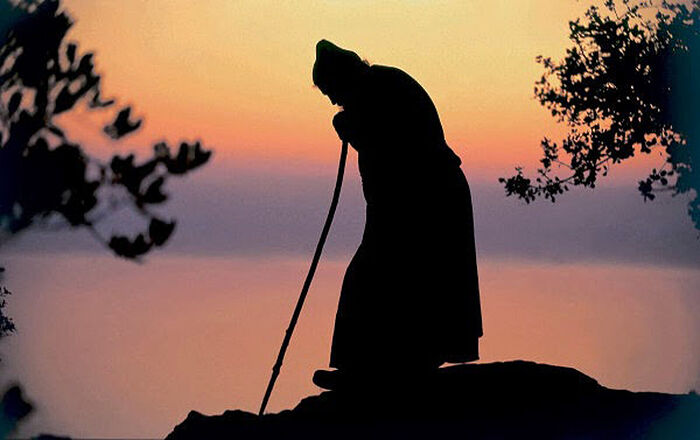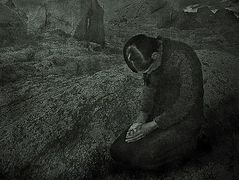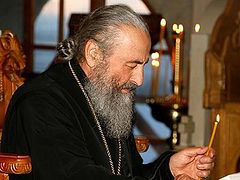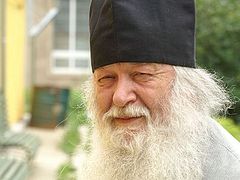Part 1. Repentance is the Awareness that Communion is Lost
His Grace Bishop Atanasije (Jevtić) of the Serbian Orthodox Church reposed in the Lord on March 4. Thousands of Orthodox faithful, including hierarchs, clergy, monastics, and laymen came out to bid farewell to the beloved former hierarch of Zahumlje and Herzegovina at his funeral and burial on March 6. Bp. Atanasije was a spiritual child of the great dogmatician St. Justin (Popović) and was a respected theologian in his own right. In fact, in his message read out at Bp. Atanasije’s funeral, His Holiness Patriarch Porfirije numbers him together with the great theologians Sts. Justin and Nikolai (Velimirović).
In honor of his memory and the first week of Great Lent, we present a translation of a talk he gave in 1988 on repentance, confession, and fasting, which the Church calls us to focus our spiritual energy on during the Great Fast.
I remember one Russian sufferer, a former librarian at our faculty.1 He was in Dachau for four years. He adopted and raised a Serbian orphan, then got him married. Then the wife drove the old man out of the house. Then the old man died very poor. He said that in Dachau, you could see in people’s faces who had a living communion with God. There was no hypocrisy there. He told me, among other things, that, in his opinion, Berdyaev never had a living contact with God. Of course, Berdyaev is a tragic figure, a sufferer, a kind of martyr, and you can’t just reject him. But he’s too pretentious. He didn’t know humility and even scolded humility.
We have to humble ourselves before God, but certainly not out of an “inferiority complex.” Job was sick, much-suffering, but he was not “inferior” before God. He was humble, and this humility gave him boldness. “Come down from Heaven,” Job said to God, and God came down. We don’t need to accept any psychological or social categories, Humility is not weakness, but boldness. For example, I go to see Vladyka Mark. I have no money, I could die here, but I have hope that Vladyka will feed me and not abandon me. This is boldness. Otherwise, I underestimate not only myself, but also Vladyka.
Here’s how the ancient Christians prayed. One Egyptian monk said: “I have sinned as a man. You, as God, have mercy.” Humility and boldness go together, hand-in-hand.
Altogether, starting with repentance—whether repentance presupposes faith or is born in faith—it’s all the same—they go together. Faith in God includes immediate repentance in my tragedy, in my problem, in my life. I absolutely don’t agree to solve my problem without God. That means, I’m seeking communion. And God showed through Christ that He desires communion with us. He gave His Son! He loved us before we loved Him. That means He too seeks communion. This is a God Who truly loves mankind, an active God, a God Who some Fathers have called “the antecedent of eros.” To enter into His omnipotence, He comes out to meet us, thereby limiting Himself to our measure, in order to receive us. This is called kenosis. If He simply came to us, it would be like the sun burned us up—we would simply disappear. But He diminished Himself out of love, seeking communion with us, not forcibly—He simply wants it Himself. This immediately gives us dignity.
Therefore, our Orthodox Christian Tradition has a great foundation for boldness, for hope in God. Man is sinful, but still, God is greater than sin! In Dostoyevsky’s Demons, Elder Tikhon said to Stavrogin: “You have but one more step to reach the saints.” And indeed, man can take this one step and meet God. It’s never impossible. It’s impossible for man, but possible for God. God entered into this relationship with us and doesn’t want us to resolve our problems without Him. And we have no foundation to doubt this, for He even gave His Son.
Such powerful reasons for repentance we have. This isn’t just some kind of moral teaching of man, that we have to be good and therefore we must repent. No, repentance renews within us the very foundations of the Christian faith. God desires our salvation. He seeks it, thirsts for it, and waits for it. For our part, we simply have to want it, and then we will be able to, not by ourselves, but by God.
Repentance, with all the Christian virtues that accompany it, such as confession, humility, boldness, hope, fasting, prayer… Repentance is a foretaste of the resurrection, even the beginning of resurrection. It’s man’s first resurrection. The second will be the result, the consummation during the Second Coming of Christ.
Such an experience of repentance doesn’t exist in any religion, in any spiritual experience, in any mysticism. Unfortunately, even Western Christianity has nearly lost this feeling, this experience, this event.
Fr. Justin told us that he was studying at Oxford from the beginning of 1917 until 1919. After two years of friendship, one Anglican monk said to him: “You are all young and happy like we are, but one thing you have that we as a church don’t have is repentance. We don’t know it…” “The thing is,” said Fr. Justin, “that he and I once had a serious fight. Then I couldn’t stand it any longer and I went to him to ask forgiveness. I threw myself at his feet and wept, and he accepted it. So he saw repentance.”
The Fathers teach that we shouldn’t inflate our passion; we shouldn’t even “step on anyone’s shadow,” but for it to be true humility, it must be done with love, that is, it can’t just be indifference to the state of our brother. Otherwise, it’s not humility and not passionlessness, but just some kind of conventional attitude. It’s a “good tone,” that is, officially-established hypocrisy: Don’t interfere in other people’s affairs. (Let the people die in Vietnam, Yugoslavia, and Cuba). It all comes down to appearances.
As Fr. Justin loved to say: Culture is very often a varnish, but inside it’s a worm. Of course, you don’t have to be aggressive. But God led us Orthodox Christians through history in such a way, we opened ourselves to Him such that we can’t do anything without problems. But recognizing the status quo, recognizing the abnormal regime as normal is not Christian. Repentance though is precisely a protest against the abnormal state. There are difficulties in a family, in a parish, a diocese, a state, in the world—a Christian cannot “come to terms” with this. He will certainly struggle. But he begins with himself, so repentance is self-condemnation, self-restraint, or, as Solzhenitsyn said, or as Tarkovsky said, it is shame—shame as a religious concept, in the sense that a man returns to himself and begins to be ashamed.
At the end of Abuladze’s film Repentance it’s clear what true human repentance is. Man begins to be ashamed of his deeds and immediately finds the determination to change. We can say that only in Orthodox countries—in Russia, in Serbia, in Greece—do they have the theme of repentance (even in literature). Lubardo’s novel Repentance was published here recently, on the relations of Serbs, Muslims, and Catholics in Bosnia. And only the Serbs in this novel repent. And the Serbs don’t just talk about, but actually work repentance.
Glory to God, that means we are sinners. And this isn’t pride—we don’t praise ourselves, but we cannot reconcile ourselves to such a situation, be it ours or someone else’s. Fr. Justin called this the true revolutionism of Christians against sin, against evil, against the devil, against death. It is a revolt of man against his false self, and a revolt against the falsehood in other people, and in religion it is a revolt against false gods and the battle for the true God. Repentance seeks a true vision of the world, of God, of man; it seeks the true faith.
I am personally astounded that in Russia, masses of young people are returning to God, to Orthodoxy now. It’s the same here. It’s not just to find faith in any god, to throw off atheism and find any kind of mysticism, but to find the living God, to join the true life of the Church. I read a good article by Vladimir Zelinsky the other day—“The Time of the Church.” You can see how a man found God, found Christ, found the Church. If someone just repented somehow and wants to live, regardless of what church he belongs to, then I doubt the authenticity of even this initial repentance. It’s some kind of metamelia, not metanoia. It’s not a genuine restoration of life. That’s why the Fathers so zealously stood for the faith.
But we mustn’t forget that love is the first dogma of our faith. Love is the true cross, but don’t be afraid of love if it leads to the cross. Never forget that when love is on the cross, it’s still love. Had Christ not said: Father, forgive them! then He wouldn’t have been Christ. He would have been a hero, an ideal man, but not the true Christ the Savior. In Dostoyevsky’s Grand Inquisitor, Christ even kisses the inquisitor. It’s not sentimentality, not romanticism—it’s genuine love, which knows no fear. Therefore, we Orthodox Christians always feel that our strength and invincibility is not within ourselves, but in the authenticity of what we seek, desire, believe in, and live for.
In repentance, we have to understand that God is on the other side of our good and our evil. We don’t have to identify ourselves with either our evil or good deeds. Don’t think you can provide for yourself by doing good. We have to hope only in God. But we must also believe that evil deeds, if I condemn and reject them, cannot separate me from my God. Russians have a tendency to exaggerate their sins, and suffocate, and sink into them, as in an abyss. This is a kind of distrust in God. Such a perception, the exaggeration of one’s own sins is at the same time a depreciation of God. But the opposite approach represents God as a liar. He sent His Son to save us, and we say: “No, that’s not necessary, I don’t have any sin…”
Christ saves us for free! There is no retribution or compensation on our part. But we must truly understand that sin is sin, and sin is evil, and sin is a lie, and sin is the enemy of man. Full repentance in Orthodoxy is courageous, not sentimental. Man rises up to the battle. The Holy Fathers say that man has the gift of rage, anger, and that it is a gift of God, like the gift of the ability to eat. But the gift of food can quickly grow into a passion for food. It’s the same with anger, behind which is movement—dynamics. Virtue must be aggressive—active, not passive. But if it’s deformed, it can become a tyranny for others and turn into aggression.
But we must be dynamic! We have to fight with evil. Orthodox repentance has this “rage.”
I was told about how one of the eldest monks of Meteora, Fr. Varlaamos, got knocked on the head and had a brain hemorrhage. It happened during the afternoon rest. He was lying there and suddenly saw that everything all around was turning red. He tried to get up from his bed, but was unable. Then suddenly a thought burst forth from the depths of his soul: “I’m dying, and I haven’t confessed or communed! Can it really be that I’ve been a monk for so many years and I’m going to die without Communion?” And by sheer strength of will, he got up, and didn’t even know how he found the door. God helped: The abbot was coming out of his cell just then and saw him in such a state. The monk yelled: “What are you looking at? Communion!” The abbot understood immediately, and the monk took Communion. Then he continued living. This is the power of rage!
Are you dying? So? Will you really leave yourself without Communion because of this?
St. Demetrius raised Nestor, a young Christian, and blessed him to kill the gladiator Lyaeus, a terribly cruel villain. The Church sings about this in the troparion of St. Demetrius of Thessaloniki. This is truly salvific rage, the power to stand on your feet. When Job complained, and had cause to complain, God didn’t comfort him, but demanded that he stand on his feet and submit himself. But this restored Job.
Only the Orthodox have preserved the ascetic ethos. We suffer falls, and are not embittered in patience, and do not become indifferent to others. I cannot be indifferent. And I cannot, as a Christian, allow myself to hate, because hatred is an escape from Christian responsibility.
This also happens in parishes. A man thinks another person hates him and thus creates an alibi for himself not to talk with him. But we have to try to enter into communication, to make our neighbor’s problem our own. And we shouldn’t feel sorry for him with some pride, but with real compassion.
Christianity is dynamic, not passive. Christianity is not “apathy” as the ancient Stoics understood it. The point isn’t to kill yourself, but to kill your service to evil and sin within yourself and make yourself a worker for God. Life is not nirvana. Life is communion, glory to God, elevation, and growth. Therefore, repentance is real if it occurs truly and actively, if it immediately awakens a man, if he immediately feels called.
If we compare St. Isaac the Syrian and St. Symeon the New Theologian, St. Isaac is much more sullen and sad. St. Symeon the New Theologian is joy and dynamism. He is completely in joy.
This sadder and more sullen side is rather expressed by the West—St. Clare, for example. When the grace of God leaves them, they are lost in despair. In Orthodoxy—no! Here man says: “God visited me, He gave me His grace, but He wants to raise me up by it.”
On Mt. Athos, I always had the impression that Athonites are great ascetics, deprived of many of the pleasures of life, but always with joyful faces. And they are all original, because everyone is living a vibrant life.
Repentance excites good “ambition” in man. Let us recall the Prodigal Son: “Am I, the son of such a father, really created to feed pigs in a foreign land? No! I will go to my father.”
Repentance, prayer, fasting, confession—all of this is spontaneous. We have to position ourselves to have this freshness of Christian life and strive for it. And as the ancient Fathers said, we must begin anew every day.




